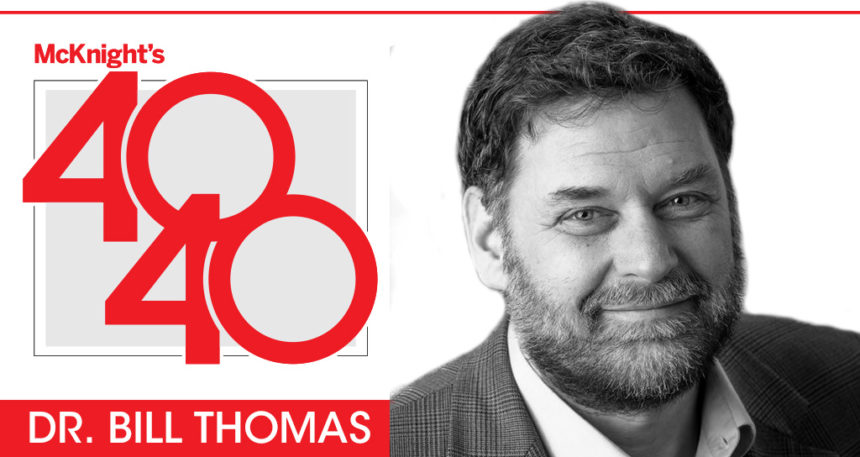
Editor’s note: As part of the 40th anniversary of McKnight’s, McKnight’s Long-Term Care News and McKnight’s Senior Living are recognizing 40 notable newsmakers. Each week, the brands will highlight a high-profile leader from the past four decades. Published installments of the series can be found here.
Dr. Bill Thomas defies easy description.
His multifaceted career has included stints as a physician, professor, playwright, performer, businessman – and more. But to most in this sector, he’s simply a guy redefining the meaning and shape of eldercare in America.
In the early 1990s, Thomas and wife Jude developed the Eden Alternative as a counterpoint to the traditional nursing home experience. Its purpose was to relieve what he called the “three plagues” of eldercare: loneliness, boredom and helplessness. Pets, gardens and children were treated as not just welcome, but necessary. The model also ushered in a less hierarchical relationship between management and staff.
In 2003, he launched The Green House Project. The idea behind the initiative was to tear down large nursing homes and replace them with small, home-like settings that allowed residents to experience life more fully. There are now hundreds of officially licensed Green House homes in dozens of states, and many more that follow similar principles.
As a professor at The Erickson School at UMBC, he led development of the nation’s first emergency department designed for older adults.
In 2014, he organized a “non-fiction theater” roadshow bus tour to more than 20 cities nationwide. It highlighted spoken word, film, art and live music performances and offered new approaches to growth, aging, health and wellness.
His latest innovation is Minka Homes, which he sees as a legitimate replacement for assisted living and nursing facilities. The term is derived from a simple and functional style of Japanese home.
These small, senior-friendly houses can be clustered like mushrooms in tight groups — or tucked onto the owner’s existing property. The payoff: Caregivers or children can occupy the larger house and help when needed.
For Thomas, the future remains a work in progress. You might say that’s true for him as well.




